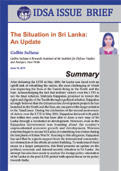The Situation in Sri Lanka: An Update
 After defeating the LTTE in May 2009, Sri Lanka was faced with an uphill task of rebuilding the nation, the most challenging of which was improving the lives of the Tamils living in the North and the East. Acknowledging the fact that military victory over the LTTE is not the final solution, Mahinda Rajapaksa promised to restore the rights and dignity of the Tamils through a political solution. Rajapaksa strongly believes that the infrastructure development projects he has launched in the North and the East, are one part of the larger solution to the Tamil issue. During the celebration of the second anniversary of victory over the LTTE in May 2011, Rajapaksa declared with pride that within two years he has been able to draw a new map of Sri Lanka through a revolution in development. However, even as the Rajapaksa Government was boasting about the country’s unprecedented economic growth and development, Western countries began to accuse Sri Lanka of committing war crimes during the last phase of Eelam War IV. Reacting to this allegation, Rajapaksa has said that he expects support from the international community, not obstruction of his efforts at nation building. To understand these issues in a larger perspective, this Brief presents an update on the political, economic and internal security situation in Sri Lanka. An attempt has also been made to analyse the foreign policy orientation of Sri Lanka in the post-LTTE period with special focus on its policy towards India.
After defeating the LTTE in May 2009, Sri Lanka was faced with an uphill task of rebuilding the nation, the most challenging of which was improving the lives of the Tamils living in the North and the East. Acknowledging the fact that military victory over the LTTE is not the final solution, Mahinda Rajapaksa promised to restore the rights and dignity of the Tamils through a political solution. Rajapaksa strongly believes that the infrastructure development projects he has launched in the North and the East, are one part of the larger solution to the Tamil issue. During the celebration of the second anniversary of victory over the LTTE in May 2011, Rajapaksa declared with pride that within two years he has been able to draw a new map of Sri Lanka through a revolution in development. However, even as the Rajapaksa Government was boasting about the country’s unprecedented economic growth and development, Western countries began to accuse Sri Lanka of committing war crimes during the last phase of Eelam War IV. Reacting to this allegation, Rajapaksa has said that he expects support from the international community, not obstruction of his efforts at nation building. To understand these issues in a larger perspective, this Brief presents an update on the political, economic and internal security situation in Sri Lanka. An attempt has also been made to analyse the foreign policy orientation of Sri Lanka in the post-LTTE period with special focus on its policy towards India.







